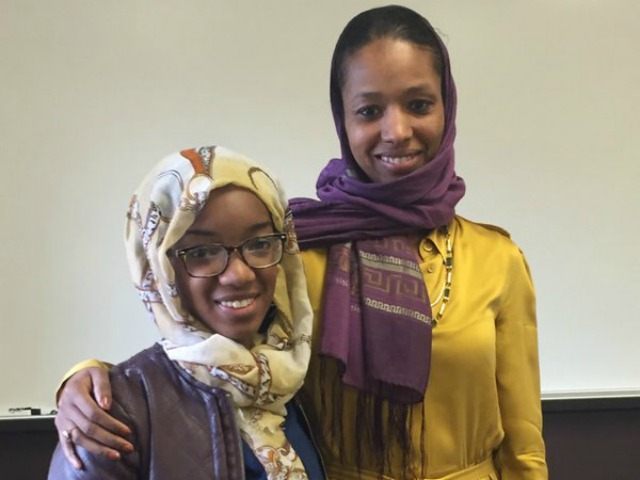A political science professor at Wheaton College is on administrative leave after wearing a hijab to show solidarity with Muslims.
She also reportedly consulted with the Council on American Islamic Relations (CAIR) — linked to the Muslim Brotherhood — prior to doing so in order to ensure she did not offend Muslims.
Larycia Hawkins – an associate professor at the private evangelical Christian college – announced last week she would wear the hijab to demonstrate support for Muslims in the aftermath of the shootings in Paris and San Bernardino, California. She also used the gesture as a platform to suggest Christians and Muslims worship the same God.
According to the Chicago Tribune, Hawkins sought advice from CAIR to ensure, in wearing the hijab, she did not offend Muslims.
“There’s a lot of misconception about why women wear hijab and this idea that women are forced to wear it,” said Renner Larson, communications director for CAIR’s Chicago chapter and a non-Muslim. Renner said he was intrigued by Hawkins’ decision.
“For a lot of people it’s a very powerful choice, especially in the United States it can be a hard, uncomfortable choice,” he added. “So often women wearing hijab are the targets of attack and hatred because more than anyone else they are so immediately recognizable as Muslim.”
While Wheaton College did not denounce Hawkins’ decision, its concern was that it lacked theological clarity.
“In response to significant questions regarding the theological implications of statements that Associate Professor of Political Science Dr. Larycia Hawkins has made about the relationship of Christianity to Islam, Wheaton College has placed her on administrative leave, pending the full review to which she is entitled as a tenured faculty member,” said a Wheaton College statement Tuesday regarding Hawkins’ suspension.
“Wheaton College faculty and staff make a commitment to accept and model our institution’s faith foundations with integrity, compassion and theological clarity,” the College continued. “As they participate in various causes, it is essential that faculty and staff engage in and speak about public issues in ways that faithfully represent the College’s evangelical Statement of Faith.”
On December 11, the College released the following statement (excerpt provided) regarding the issue of Christians and Muslims worshiping the same God:
While Islam and Christianity are both monotheistic, we believe there are fundamental differences between the two faiths, including what they teach about God’s revelation to humanity, the nature of God, the path to salvation, and the life of prayer.
Our Community Covenant explores specific obligations of Christian morality, including affirming the call to love our neighbors as ourselves; to uphold the God-given worth of human beings, from conception to death, as the unique image-bearers of God; and to give faithful witness to the Gospel. The Scriptures, as well as the Community Covenant, hold us accountable to reject injustice, prejudice, and the taking of innocent life.
As a Christian liberal arts institution, we value a robust exchange of ideas on the critical issues of the day. Faculty and student expressions of concern about the treatment of Muslims have been grounded in a desire to live peaceably and respectfully with all people, including our neighbors of Islamic and other religious faith traditions. While these commitments are consistent with our Statement of Faith and Community Covenant, overtures of Christian friendship must be enacted with theological clarity as well as compassion.
We celebrate our religious liberty as American citizens under the Constitution, and fervently defend the free exercise of that liberty by those of other faiths in the same way that we desire respect of and protection for our own religious liberty.
Hawkins, 43, said she donned the hijab as part of her Advent devotion until Christmas. According to the Tribune, she wore it on her flight home to Oklahoma where voters overwhelmingly approved a state constitutional amendment banning Islamic Sharia law in 2010.
On Sunday Hawkins posted on Facebook:
This morning, I partook of the Eucharist, the culmination of the Christian liturgy where Christians through the centuries have united around a common table to practice hospitality by the eating of bread and the drinking of wine, to seek forgiveness from those we’ve hurt or offended, and to grant forgiveness to ourselves and to others. It is a table of reconciliation–both spiritual reconciliation and relational reconciliation.
Since I recently embarked on #embodiedsolidarity with women who wear the hijab (#wish), I’ve received pushback almost exclusively from other Christians. The pushback has primarily centered on the claim that Christians and Muslims worship the same God. In the spirit of the unity of what Christians term the body of Christ, I would like to respond–but will not reply to comments on an internecine dispute that arose rather recently in the history of the church…
The apostle Paul declares, “…as far as it depends on you, live at peace with everyone” (Romans 12:18). That includes those of you who now count me apostate for daring to call fellow humans who happen to be Muslim my brothers and sisters. I love you with the power of the love that saved me and keeps me and bids me do justice in my body…
Your sister in the hijab,
Larycia
According to her bio at Wheaton College, Hawkins previously worked in state government administering federal programs, including the Social Security Disability Programs and the Community Development Block Grant.
Her research interests include issues dealing with race, religion, and politics. Her current research agenda includes “projects that explore the extent to which black theology frames black political rhetoric and how black theology is reflected on black political agendas, like those of the Congressional Black Caucus and the NAACP; and a project that considers the political activism of black congregations outside the ambit of the black church (i.e. black Catholic parishes, United Church of Christ).”
Hawkins earlier tweeted in support of Black Lives Matter:

COMMENTS
Please let us know if you're having issues with commenting.